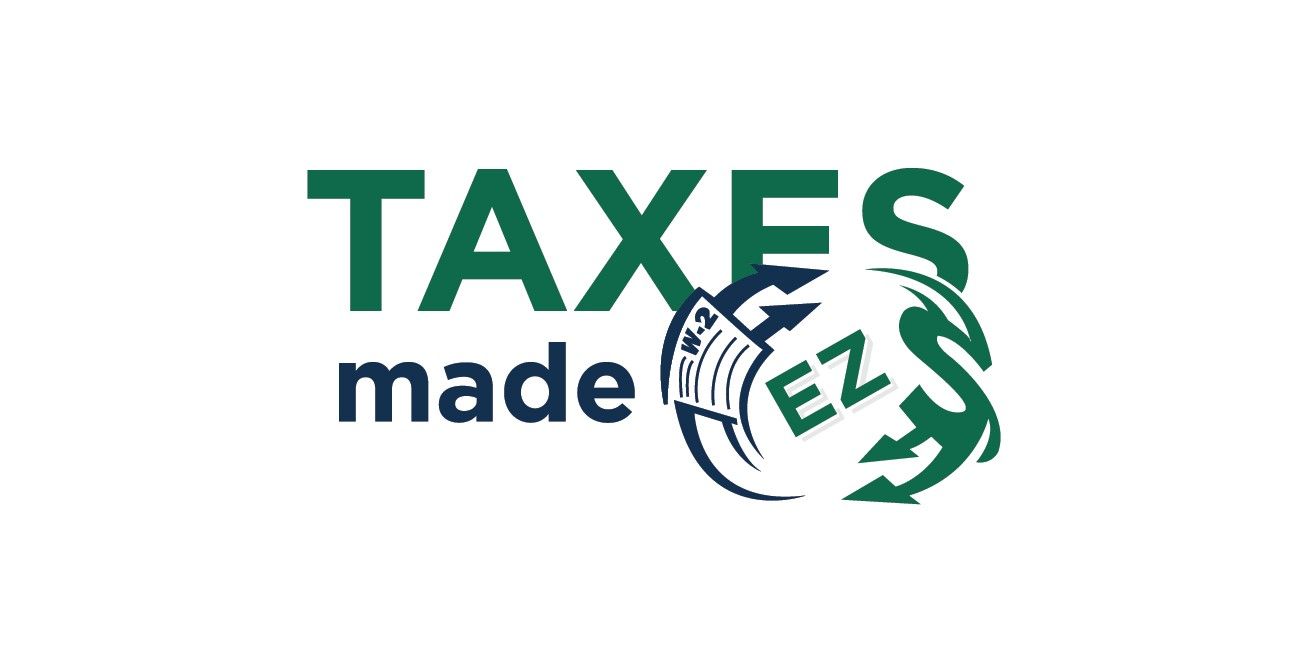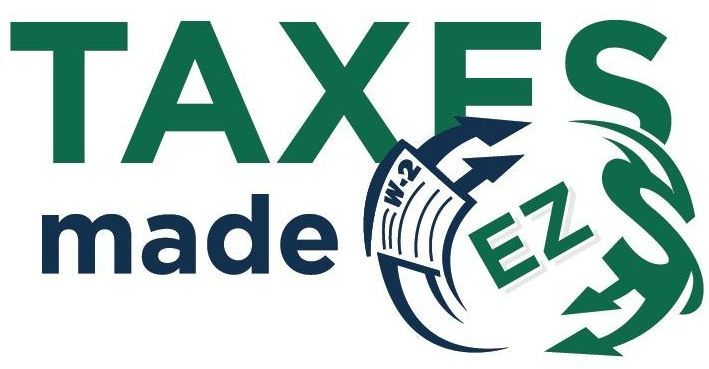
At Taxes Made EZ, we understand that tax planning is essential for individuals in all financial situations, but it becomes even more critical for high-income earners. Proper tax planning can optimize deductions, maximize savings, and create a long-term strategy to reduce tax burdens while fully complying with tax laws. Below are some key strategies and tips specifically for high-income earners. Minimize Your Tax Liability The U.S. tax system is progressive, meaning that your income increases, so does your tax rate. High-income earners fall into the highest tax brackets, with marginal rates reaching 37%. Strategic tax planning is vital to reduce your taxable income and minimize your debt. One effective way to do this is by contributing to tax-deferred retirement accounts such as a 401(k) or traditional IRA. These contributions lower your taxable income while helping you build a solid retirement plan. Additionally, contributing to Health Savings Accounts and 529 college savings plans offers tax advantages. HSAs provide tax-free funds for qualified medical expenses, and 529 plans help you save on education costs. Maximize Deductions and Credits For high-income earners, itemizing deductions can provide far more tax savings than the standard deduction. Some of the most beneficial deductions include mortgage interest, charitable contributions, and state and local taxes up to $10,000. Planning ahead can further enhance these deductions by strategically timing charitable donations or deferring income into the next tax year. Tax credits can also directly reduce your tax bill, making them extremely advantageous. High-income earners should explore credits for energy-efficient home improvements, educational expenses, and other applicable credits. These credits can significantly lower your overall tax liability, and checking eligibility each tax year is essential. Manage Investment Income High-income earners often generate significant income through investments in stocks, bonds, real estate, and other assets. Investment income is subject to different tax rules, and smart planning is essential to minimize taxes in this area. For example, holding investments for more than a year benefits you from lower long-term capital gains tax rates, while short-term gains are taxed at your regular income tax rate. Tax-loss harvesting can also be a valuable strategy—selling losing investments to offset gains and reduce taxable income. Additionally, focusing on assets that generate qualified dividends, which are taxed at the lower capital gains rate, can provide further tax savings compared to ordinary income. Consider Estate and Gift Tax Strategies For individuals with significant wealth, estate and gift taxes can take a large chunk of your assets, with estate tax rates reaching as high as 40%. Estate planning is crucial to minimize the impact of these taxes and protect your wealth for future generations. High-income earners can take advantage of strategies such as gifting assets to heirs. The annual exclusion limit allows you to gift up to $17,000 per recipient, tax-free. Additionally, establishing irrevocable trusts can protect your assets from estate taxes while enabling you to pass on wealth in a tax-efficient manner. Partner With a Tax Professional At Taxes Made EZ, we are committed to putting your financial goals and circumstances first. Our team stays current on the latest federal and state tax laws, and we specialize in working with high-income earners and individuals with complex financial situations. We’re here to help you navigate the intricacies of tax planning, ensuring you take full advantage of every opportunity to reduce your tax burden. When you partner with us, you can feel confident knowing that our tax experts are working to safeguard your financial future. Let us help you simplify your tax-filing process while maximizing your savings. Call us today at (856) 232-0958 or schedule a consultation to learn more.

A Roth IRA, or individual retirement account, is a powerful tool to help secure your financial future. Unlike traditional retirement accounts, contributions to a Roth IRA are made with after-tax dollars. This means you pay taxes on the money upfront, but the funds grow tax-free, and withdrawals in retirement are also tax-free, as long as certain conditions are met. Below, we’ll explore the benefits of a Roth IRA and strategies to maximize its potential. Understand the Benefits A Roth IRA offers several key benefits that make it an attractive option for retirement planning. The primary advantage is tax-free growth. Since you contribute after-tax dollars, your investment earnings grow tax-free, and withdrawals made after retirement, once you meet the conditions, are also tax-free. To qualify, you must have held the account for at least five years and be 59 and a half years old. Additionally, unlike traditional IRAs, Roth IRAs do not require mandatory distributions at age 73. This lets your investments grow for as long as you want, giving you greater control and flexibility over your financial future. Maximize Contributions Maximizing your contributions is essential to get the most out of your Roth IRA. While large donations are ideal, even negligible, consistent amounts can add up over time, thanks to the power of compound interest. For 2024, the contribution limit is $6,500 per year, or $7,500 if you're 50 years old or older. Check income eligibility limits, as they can affect how much you can contribute. Starting early and contributing regularly can significantly boost your retirement savings in the long run. Diversify Your Investment Strategy It’s important to remember that a Roth IRA is an account, not an investment itself. You can invest in stocks, bonds, mutual funds, ETFs, and more within the Roth IRA. Diversifying your investments is crucial to manage risk and optimize growth. A balanced mix of growth-focused assets like stocks and more conservative investments like bonds can provide long-term stability. Aim for an investment strategy that aligns with your age and risk tolerance, and adjust as you approach retirement. Monitor and Adjust Over Time As your life circumstances and financial goals evolve, your Roth IRA should evolve with them. Regularly review your account, assess your contributions, and fine-tune your investment strategy. Whether your income increases or your retirement timeline shifts, periodic adjustments can ensure that your Roth IRA remains aligned with your financial goals. Combine With Other Retirement Plans One of the advantages of a Roth IRA is that it can complement other retirement plans, such as a 401(k). A 401(k) offers tax-deferred savings, while a Roth IRA grows tax-free. Having a combination of tax-deferred and tax-free accounts gives you more flexibility in retirement, allowing you to manage your withdrawals more efficiently and potentially reduce your overall tax burden. Plan for a Secure Future Planning your financial future with a Roth IRA can provide long-term financial security, especially when paired with other retirement strategies. Consider consulting one of our expert tax professionals to ensure you’re making the most of your Roth IRA and other retirement accounts. We can guide you through the process and help you maximize your retirement savings. Call us today at 856-232-0958 or schedule a consultation to get started.

Owing back taxes can seem overwhelming, but with the right approach and the help of our experts, you can repay and avoid any significant penalties or future issues. At Taxes Made EZ, we have handled many unique tax situations and understand how to help you. Below are some steps you and one of our tax experts can take together to combat taxes. Determine How Much You Owe The IRS will typically notify you and specify the amount that you owe. Additionally, you can review tax notices, access your tax transcript, or contact the IRS to determine the amount. It is essential to maintain open communication with the IRS and track the notices or letters issued. File Your Late Tax Returns If you cannot pay your balance immediately, filing your tax return is still important. Failing to do so can result in significant penalties. Book an appointment with one of our experts today, and we will walk you through the entire tax-filing process. We are with you every step of the way, from preparation to filing and repayment. There is no situation we cannot handle, and we will ensure your filing process is as simple, easy, and stress-free as possible. Review Your Options to Pay You have several repayment options. We can help you determine what is most sensible for your financial situation. Pay in full: The quickest way to resolve this issue is to pay in full. However, this may only be an option for some. Short-term plan: If you need more time and can pay in up to 180 days, you may enroll in a short-term repayment plan that does not require a formal application. Long-term plan: The IRS also offers long-term payment plans, or an installment agreement, to pay over time. You may accrue some fees, but dividing your debt into more manageable monthly payments will allow you to divide it. OIC: An Offer in Compromise (OIC) program allows you to settle your tax debt for less than the total amount based on your financial situation and if you qualify. Temporary delay: If you are facing severe financial hardship, you can request that the IRS temporarily delay collections until your situation improves. However, you will continue to rack up interest and penalties. Address Any Penalties or Interest Back taxes can come with interest and penalties that quickly add to your debt. Below are some to be aware of: Failure to file: typically a penalty of 5% of unpaid taxes for each month the return is late, up to 25% Failure to pay: 0.5% of the unpaid taxes for each month it's late, increasing up to 25% Interest on unpaid taxes: interest is charged from the original due date and compounds daily Sometimes, you may request a penalty abatement, which can reduce or remove penalties. This is usually granted with a valid reason for not paying, such as illness or a natural disaster. Avoid Future Tax Problems Once you are clear, avoiding this issue in the future is essential. You may want to submit an updated W-4 to your employer to ensure you withhold enough from your paychecks. If you are self-employed or receive untaxed income, make quarterly estimated payments to avoid accumulating debt. Stay organized, detailed, and diligent when tracking your expenses to simplify your taxes and avoid stress. Call us at (856) 232-0958 or schedule a call today.

We know tax season is not everyone’s favorite time of year. Taxes Made EZ is here to make your tax filing process as simple, easy, and stress-free as possible. Our team of experts has many skills and knowledge to take on any situation and maximize your benefits. There are several ways that you can prepare to simplify your process with our checklist for success. Organize and Collect Personal Information Gather some essential information and documents that will be necessary for filing including: Social security number (SSN) for yourself, your partner, and any dependents Taxpayer identification number (TIN), if applicable Bank account information Gather Income Documentation W-2 forms for salaried employees (your employer should provide these) 1099 forms if you are self-employed, a contractor, or receive other income such as free earnings, investment dividends, or real estate sales Unemployment forms (1099-G), if applicable Collect Deduction and Credit Records It is important to track your deductions and have this information handy when filing. Below are some examples. Medical and Dental Expenses: receipts for out-of-pocket medical costs, prescriptions, and insurance premiums Education expenses: 1098 T-for tuition payments or 1098-E for student loan interest Charitable contributions: proof of any donations made to qualified organizations Mortgage Interest (1098): form from your lender for home loan interest Childcare costs: payments made for child or dependent care, along with the provider’s TIN Track Investment and Retirement Income If you have an investment profile, you may need additional documentation as listed below: 1099-B: to report gains or losses from sales of stocks or mutual funds 1099-DIV/1099-INT: for dividends and interest income Retirement plan contributions: keep records of contributions to IRAs, 401(k)s, or other retirement accounts Required Minimum Distributions (RMDs): if you are over 72, track any mandatory withdrawals from your retirement accounts Book your Appointment! Once you have gathered your information and documents, we'll take care of the rest! Our helpful, experienced staff will walk you through the filing process and help you devise the best strategy for your situation. Our job is to take the burden off your shoulders and give you a sense of relief knowing that a team of experts is handling your taxes. Experience the peace of mind that comes with professional tax support. Call (856) 232-0958 or schedule a call today to learn how proactive tax planning and preparation services can benefit you. Your financial success is our priority.

We know that taxes can be complicated, and being a rental property owner may present a whole new set of processes and questions. At Taxes Made EZ, we’ve got you covered. We understand that everyone’s situation is unique, and we want to make your tax filing process as simple, streamlined, and beneficial as possible. Below is some information and a few tips for rental property owners. Reporting and Filing First and foremost, all rental income must be reported on your tax return. This includes not just rent payments, but also advance rent, non-refundable deposits, and expenses the tenant pays. The only exception is for short-term rentals. You do not need to report this income if you rent your property for fewer than 15 days a year. Rental income and expenses should be reported on Schedule E (Form 1040), so you should familiarize yourself with this form before filing. You should also be aware of your state and local tax obligations, which can vary. Deductible Expenses As a rental property owner, you can deduct various expenses to reduce your taxable income. These include local property taxes, interest paid on loans to acquire or improve rental properties, and operating expenses such as maintenance, utilities, and insurance. You can also deduct depreciation on the property, not including the land, over 27.5 years for residential properties. Fees for property management, legal advice, and tax preparation related to the property can also be deducted. Passive Activity Losses The IRS considers rental activities passive, meaning losses from these properties generally cannot be deducted. However, there are a few exceptions to be aware of. One is special allowances for rental real estate. If you actively participate in managing the property, you may deduct up to $25,000 of losses against non-passive income. Also, if you qualify as a real estate professional, rental activity is not considered passive, and losses can be deducted against other income. Tax Planning Strategies There are several unique tax strategies for rental property owners that can be especially useful when filing. A 1031 exchange allows you to defer capital gains taxes when you sell a rental property, provided the proceeds are invested in another similar property. If you manage your rental properties from a home office, you can deduct related expenses. Cost segregation is another strategy to consider, as it can accelerate depreciation deductions for certain components of your property, including appliances and landscaping. Taxes Made EZ is here to answer all your tax-related questions and use our expert guidance to make the process as simple and stress-free as possible. Call us today at (856) 232-0958 or schedule a call today.

Charitable giving has a plethora of benefits not only for those who receive it but also for yourself and your business. It promotes action and positive change and uplifts people and the community around them. It should always be considered and encouraged when possible. Charitable giving can also have many benefits when it comes to your tax return and maximizing the impact of your donations. Understand Deductible Donations It is important to understand that not all charitable donations are tax-deductible. To qualify for a deduction, donations must be made to a qualified organization recognized by the IRS, such as 5019(c)(3) nonprofits. It is so important to research the organizations you choose to donate to and understand their mission, status, etc. Consider Donating Appreciated Assets or DAFs One option to consider is donating appreciated assets like stocks or mutual funds instead of cash. This approach allows you to avoid paying capital gains tax on the appreciation and still deduct the full fair market value of the assets on your taxes. This is especially advantageous when you have held the asset for over a year, and it has significantly increased in value. Donor-advised funds (DAFs) allow you to make a charitable contribution, receive an immediate tax deduction, and recommend grants from the fund to your chosen charities over time. They provide valuable flexibility and allow you to make larger contributions in high-income years and distribute them strategically to charities later. Utilize Gift Matching Programs To maximize your donation, use gift-matching programs. Some employers offer programs that can double or sometimes even triple the impact of your donation. Talk to your employer and learn what they may offer and all the necessary procedures to ensure your gift is matched. Keep Detailed Records As always, it is paramount to stay organized and keep detailed records of deductions. Keep records of your contributions, including bank statements, receipts, written communication from the charity, etc. Be incredibly diligent about keeping receipts of cash contributions, acknowledgment letters for donations over $250, and appraisals for non-cash donations over $5,000. Keeping detailed records is always a good idea and can substantiate your deductions should you be audited. Itemize your Deductions You must itemize charitable donations on your taxes on Schedule A of your Form 1040 to claim charitable contributions. If your deductions exceed the standard deduction, itemizing them can be very beneficial. Remember that the more you donate, the higher your itemized deductions may become, potentially lowering your taxable income. We know taxes can be complicated, and we’re here to answer all your tax questions. Our trusted team of experts is here to offer you guidance and support throughout the entire tax process. Call (856) 232-0958 or schedule a call today .

Taking proactive steps now can help you minimize your tax liability and maximize available benefits. At Taxes Made EZ, we provide essential tips and strategies to ensure you’re well-prepared when tax season arrives. 1. Review Your Income and Expenses Start by reviewing your income and expenses for the year. This will give you a clear picture of your financial situation and help you identify areas where you can potentially reduce your taxable income. Gather all your financial documents, including pay stubs, bank statements, and receipts for deductible expenses. 2. Maximize Retirement Contributions Contributing to retirement accounts is one of the most effective ways to reduce your taxable income. If you haven’t maxed out your contributions to your 401(k), IRA, or other retirement plans, consider doing so before the end of the year. For 2023, the contribution limit for a 401(k) is $19,500 (or $26,000 if you’re 50 or older), and for an IRA, it’s $6,000 (or $7,000 if you’re 50 or older). 3. Take Advantage of Tax Deductions and Credits Ensure you’re taking full advantage of all available tax deductions and credits. Common deductions include those for mortgage interest, student loan interest, medical expenses, and charitable contributions. Tax credits, such as the Earned Income Tax Credit and the Child Tax Credit, can directly reduce the amount of tax you owe. 4. Plan for Capital Gains and Losses Consider your capital gains and losses if you’ve sold investments this year. Harvesting losses to offset gains can help reduce your taxable income. You can also use up to $3,000 of excess losses to offset other income. Be mindful of the “wash sale” rule, which disallows the deduction if you purchase the same or substantially identical investment within 30 days before or after the sale. 5. Check Your Withholding and Estimated Taxes Review your tax withholding and estimated tax payments to ensure you’ve paid enough throughout the year. If you’re at risk of underpayment, you might need to adjust your final estimated tax payment or increase withholding from your paycheck to avoid penalties. 6. Consider Charitable Contributions Donating to charity is a great way to give back to the community and receive a tax deduction. Ensure your donations are made to qualified organizations and keep detailed records of your contributions. For 2023, you can deduct cash contributions to public charities up to 60% of your adjusted gross income. 7. Utilize Flexible Spending Accounts If you have a Flexible Spending Account (FSA) for healthcare or dependent care expenses, check your balance and ensure you use the funds before the end of the year. FSAs typically have a “use-it-or-lose-it” policy, meaning you forfeit any remaining funds. 8. Consult with a Tax Professional Year-end tax planning can be complex, and consulting with a tax professional is beneficial to ensure you’re making the best decisions for your situation. At Taxes Made EZ, our team of experts can provide personalized advice and help you implement effective tax strategies. Planning and preparing for your taxes before the year ends can significantly impact your financial well-being. By following these tips and working with a professional, you can reduce your tax liability and set yourself up for a successful tax season. At Taxes Made EZ, we’re here to help you navigate the complexities of year-end tax planning. Contact us today for expert guidance and support. Call us today at (856) 232-0958 or schedule a call today .

You can take several steps to manage your tax bill and avoid severe penalties. At Taxes Made EZ, we’re here to guide you through the process and help you find the best solution. 1. File Your Tax Return on Time Even if you can’t pay the total amount you owe, it’s crucial to file your tax return by the deadline. Filing on time will help you avoid the hefty failure-to-file penalty, typically 5 percent of your unpaid taxes for each month your return is late, up to a maximum of 25 percent. 2. Pay What You Can Pay as much of your tax bill as possible by the due date. The more you pay now, the less interest and penalties you will accrue over time. If you can pay off a significant portion of the debt, it will reduce the overall financial burden. 3. Consider an Installment Agreement If you can’t pay your taxes in full, the IRS offers installment agreements that allow you to pay off your debt over time. You can apply for an installment agreement online through the IRS website if you owe $50,000 or less in combined tax, penalties, and interest. You can make monthly payments if approved until the debt is fully paid off. 4. Explore an Offer in Compromise An Offer in Compromise allows you to settle your tax debt for less than the full amount you owe if you prove that paying the full amount would cause financial hardship. When evaluating an OIC, the IRS considers your ability to pay, income, expenses, and asset equity. This option can be complex and might require professional assistance to navigate successfully. 5. Request a Short-Term Extension Sometimes, you might get a short-term extension to pay your tax bill. The IRS may grant you up to 120 days to pay in full. While this option doesn’t reduce the amount you owe, it can give you some breathing room to gather the necessary funds. 6. Use a Credit Card or Loan While using credit to pay your taxes is not always advisable, it can be an option if you can’t arrange other payment methods. Paying with a credit card or taking out a personal loan might help you avoid penalties and interest from the IRS, but keep in mind that you’ll incur interest and fees from your credit card or loan. 7. Seek Professional Help If you’re unsure about the best course of action or need assistance negotiating with the IRS, consider seeking help from a tax professional. At Taxes Made EZ, our experienced team can provide personalized advice and help you explore all available options to manage your tax debt effectively. Conclusion Owing taxes you can’t pay right away can be daunting, but you have options. You can manage your tax bill and avoid severe penalties by taking proactive steps. Remember, the key is to act quickly and seek help if needed. At Taxes Made EZ, we’re here to support you through every step of the process. Contact us today for expert guidance and personalized solutions. Contact us today at (856) 232-0958 or visit our website at www.mytaxesmadeez.com

Let’s face it, taxes can be complicated. We’re here to help. Self-employed individuals and consultants may find themself in unique financial situations that can present unique challenges and opportunities. Below are some top tax tips to help navigate and simplify your taxes. Keep Detailed Records Help simplify your tax-filing process by keeping detailed and organized records of all incomes and expenses throughout the year. It is a good idea to keep both physical and digital copies of documents whenever possible. Organize your files chronologically, by category, or whatever system works best for you. You can also use accounting software to track expenses and generate finance reports. Essentially, you have to do your homework. Preparation is key in making taxes as streamlined and simple as possible. Keep up with your records and organization throughout the year to avoid last-minute stress. Understand Deductible Expenses It is important to consider all expenses that are related to your business. There are some that you may not even realize as they interact with your daily personal life. Below are some examples that you could be deducting. See if you qualify! Home Office Deduction: If you use part of your home, like a designated office, exclusively for your business you can claim rent/leasing costs, mortgage interest, and property tax up to a certain amount Travel Expenses: Deduct any expenses related to travel for your business including travel, lodging, and meals Supplies and Equipment: Be sure to deduct the costs of all office supplies, equipment, and software Utilities and Internet: If you use your home utilities like electric, WiFi, etc., you can deduct a portion of bills Vehicle Expenses: Keep a detailed log of business-related mileage and deduct vehicle-related expenses so long as they are relevant to your business Educational Expenses: Costs for training, courses and seminars that maintain your or improve skills in your business area can be deducted Business Structure It is important to consider the structure of your business in order to create the most effective tax strategy. Different structures have different tax implications. Sole proprietor, LLC, or S-Corp are just a few examples of different tax structures. There are several factors to consider when determining the most tax-effective structure for your situation. It is important to acquire knowledge of what each tax structure implies and how this can affect your business, finances, and future. It is also very important that you are filing the correct tax forms. Making a checklist is often effective in preparing for filing and ensuring the process is done correctly and easily. Estimated Taxes Did you know? You can use Form 1040- ES to calculate and pay estimated taxes. Paying quarterly estimated taxes helps to avoid penalties and interest. This can help soften the blow of paying a lump sum annually. You will be able to organize and plan your finances and save accordingly. Plan for the Future Regularly review your tax plan and preparation to ensure it aligns with your long-term business goals. It is always important to be looking ahead and evaluating the bigger picture when it comes to finances. You also want to make sure that you are getting the most out of your taxes. Make them benefit you and help work toward your business’s goals. Self-employed individuals and consultants can have a unique tax-filing experience. Using top tax tips like these and our expert knowledge and dedication to deliver personalized tax solutions. We take care of the tax stuff, so you can focus on doing what you love. Book an appointment or call us to get tax help today.








